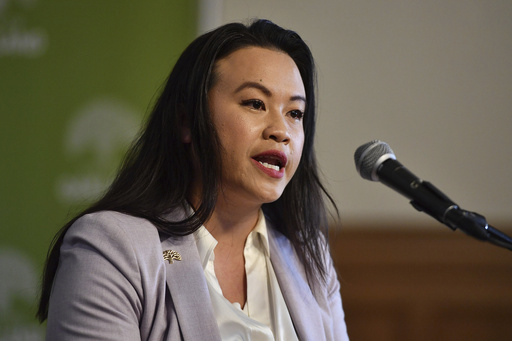
San Francisco’s electorate is contemplating whether to extend Mayor London Breed’s tenure — making her the first Black woman in the position — or to opt for one of her four Democratic rivals in a contentious and expensive battle grounded in the issues of homelessness and public safety.
The challengers, all sharing the same party affiliation, assert that Breed has neglected her responsibilities throughout her six-year administration, resulting in an escalation of homelessness, rampant open-air drug consumption, and escalating theft in retail sectors.
In a related scenario, the residents of neighboring Oakland, disenchanted with crime levels, have gathered enough support to include a recall of Mayor Sheng Thao on the ballot for Tuesday. Thao, who has been in office for just two years, faces criticism for a myriad of city issues. In response, California Governor Gavin Newsom has dispatched state highway patrol officers, prosecutors, and surveillance technology to assist Oakland in combatting crime.
Thao made history as the first Hmong American mayor in a major U.S. city when she was elected in November 2022. With a population around 400,000, Oakland often exhibits even more liberal tendencies than San Francisco. Notably, Democrat Kamala Harris, a former San Francisco District Attorney, regards Oakland as her hometown.
Supporters of the recall argue that Thao has “created a public safety crisis,” partly due to her decision to dismiss the popular Oakland Police Chief LeRonne Armstrong. The push for the recall is significantly funded by investor Philip Dreyfuss, who has yet to comment publicly. The local chapter of the NAACP has also voiced its support for the recall effort.
Adding to Thao’s challenges is an ongoing FBI investigation, which followed a raid on her home and properties owned by a politically connected family overseeing the city’s recycling contract. While Thao has consistently stated her innocence, authorities have not disclosed the scope of their investigation.
“This administration inherited numerous significant hurdles. Nonetheless, we’ve faced them directly, implemented solutions, and the data indicates we are heading in the right direction,” Thao remarked in an October statement released by her supporters.
These elections occur during a presidential election year amid nationwide conversations about public safety and a state proposition aiming to toughen criminal penalties, potentially reclassifying certain misdemeanor theft and drug offenses as felonies.
In San Francisco, recent indications suggest streets have been cleaner and fewer homeless encampments are visible; however, a daytime shooting incident involving rookie San Francisco 49er Ricky Pearsall reignited discussions about safety in the city.
Breed, who grew up in San Francisco public housing under her grandmother’s care, acknowledges that the pandemic posed significant challenges to the city, but asserts her administration has laid a strong foundation for recovery. In the primary elections held in March, she advocated for two successful measures aimed at enhancing police authority and mandating treatment for some addicts.
“We possess the necessary tools, technology, and backing,” she affirmed. “Thus, there’s no turning back; the future will only improve.”
Among Breed’s chief competitors is Daniel Lurie, a philanthropist and nonprofit founder who has invested nearly $9 million of his personal wealth into the campaign. Lurie currently leads in fundraising efforts with over $16 million raised, including a significant contribution of $1 million from his mother, businesswoman Miriam Haas, to an external committee supporting his campaign.
Mark Farrell, a former interim mayor and venture capitalist known for his conservative stance, has amassed around $5 million for his campaign. In comparison, Breed has raised more than $5 million, which includes $1.4 million gifted by former New York City Mayor Michael Bloomberg.
Other candidates on the ballot include more progressive Democrats Aaron Peskin and Ahsha Safaí, both of whom serve on the San Francisco Board of Supervisors.
San Francisco employs a ranked-choice voting system, allowing voters to rank up to ten candidates based on preference. This system can lead to a scenario where a candidate wins without obtaining the highest number of first-place votes and fosters unique alliances between rival candidates; for instance, Farrell and Safaí have agreed to encourage their supporters to list the other as their second choice.
Breed initially secured her position as mayor in June 2018 to complete the remaining term of Ed Lee. She was then re-elected in 2019 for a full term, which has extended over five years due to a change in the election schedule to align with presidential elections.
